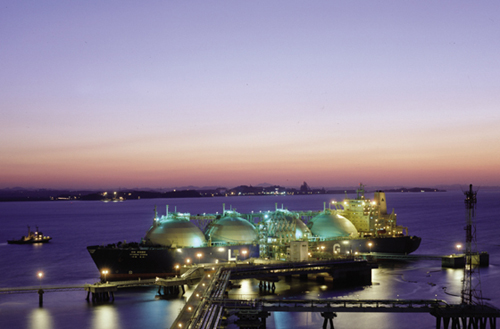Boosting LNG Exploration
KOGAS to supply 25% of domestic LNG demand by 2017


President Choo Kang-soo of Korea Gas Corp. (KOGAS) reconfirmed the company¡¯s mid-and long-term plan dubbed ¡°Vision 2017¡± to boost the number of households that use LNG to 15 million homes by 2015, up from 13 million at the end of last year, and a self-sufficiency ratio of gas to 25 percent by 2017, up from the current 2.3 percent, to fulfill the company¡¯s social responsibility.
KOGAS plans to make inroads into such regions as Africa, S.E. Asia, the Middle East and Australia to exploit LNG and increase the supply sources of gas, the CEO said.
Up until now, KOGAS has been focused on importing LNG from its own gas fields overseas and other suppliers for the domestic market, but Choo wants to change the company¡¯s management strategy by exporting LNG to its foreign customers.
To prepare for the transformation, KOGAS became a member of the UN Global Compact and the Dow Jones Sustainability Korea Index during 2009 and 2010.
KOGAS has also been strengthening its operations to supply LNG to poor households at lower charges under the ¡°Onnuri Project,¡± which also includes changing heating systems at individual households.
Choo, as the CEO of KOGAS, is fully aware of the air pollution problems in big cities and towns. He said LNG is a fossil fuel, but it does not produce much toxic fumes, which shows why towns outside Seoul have higher toxic gas in the air, since more coal and LPG are used in the local cities and towns.
The CEO, however, said KOGAS has been making efforts to lower the CO2 from LNG by setting allowable limits of toxic gas exposure at the company and encouraging its employees to do likewise at their homes. KOGAS also plans to find out what it can do to take advantage of the opportunities in the green growth policies pushed by the government based on a strategy drawn up in the first half of the year.
KOGAS is expected to recover its investment in the Zubair oil field in Iraq starting from early 2012. The field has achieved and sustained a 10-percent increase in oil production as of Sept. 23, 2010. The company joined the project on Jan. 22, 2010.
In a consortium with ENI and Occidental Petroleum Corporation (OPC), KOGAS has entered into the final contract stage as the developer of the Zubair oil field near Basra in southern Iraq, which boasts an estimated total oil production of 6.3 billion barrels. Production at the Zubair oil field has grown to more than 201,000 barrels per day from approximately 183,000 barrels a day when the consortium started field operations in the first quarter of 2010.
As a result, the consortium¡¯s contract cost recovery mechanism commences in early 2012, with a certain level of service charge provided in the form of crude oil. The consortium plans to gradually increase production at the field to roughly 1.2 million barrels of oil a day within six years. The plan appears plausible as the project is currently operating well.
The Zubair oil field project was the first time a Korean company has been involved in a project so large.
The deal not only secured a stable overseas supply of an enormous amount of crude oil for Korea, but it has also established the foundation for Korean companies to advance into the Iraqi market.
The successful bid in December 2009 gave KOGAS interest in approximately 800 million barrels of oil. The company also participated in the third round of bidding with the Iraqi government on Oct. 20, 2010, becoming an operator in the Akas gas field project. Including its acquisition of a 20 percent stake in the Mansuria gas field, KOGAS is currently involved in four resource development projects in Iraq.
KOGAS was incorporated by the Korean government in 1983. Since its founding, it has grown to become the world¡¯s largest LNG importer. As the nation¡¯s sole LNG provider, KOGAS is fully committed to providing clean, safe and convenient energy to the people of Korea. In keeping with this mission, KOGAS currently operates three LNG terminals and a nationwide pipeline network spanning over 2,739 km in order to ensure a stable supply of gas for the nation.
KOGAS imports LNG from around the world and supplies it to power generation plants, gas-utility companies and city gas companies throughout the country. It produces and supplies natural gas, purifies and sells gas-related byproducts, builds and operates production facilities and a distribution network, and explores, imports and exports natural gas for the domestic and overseas markets. nw
(from left) President Choo Kang-soo of Korea Gas Corp.; A view of a Kogas LNG terminal at night.
3Fl, 292-47, Shindang 6-dong, Chung-gu, Seoul, Korea 100-456
Tel : 82-2-2235-6114 / Fax : 82-2-2235-0799